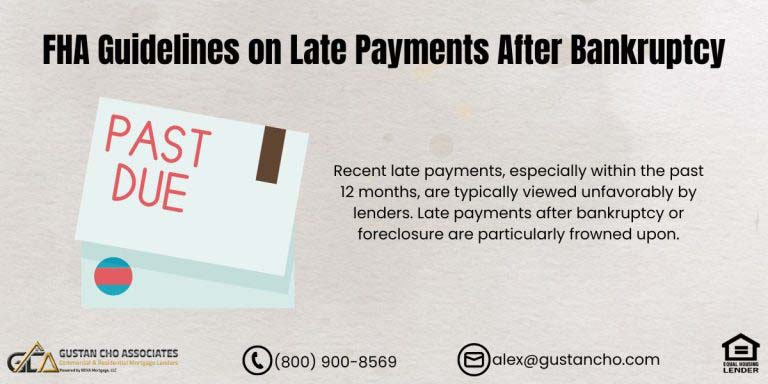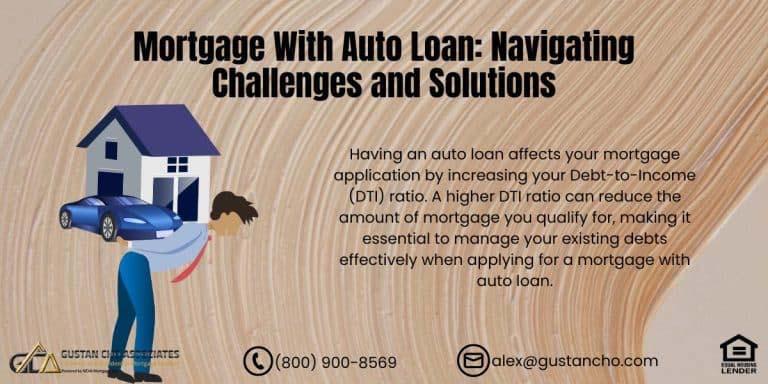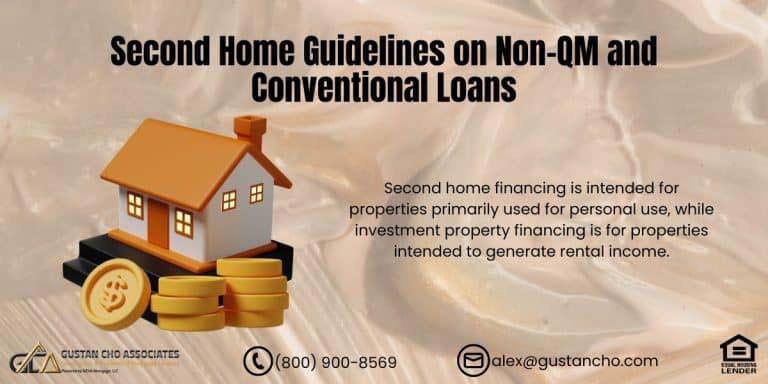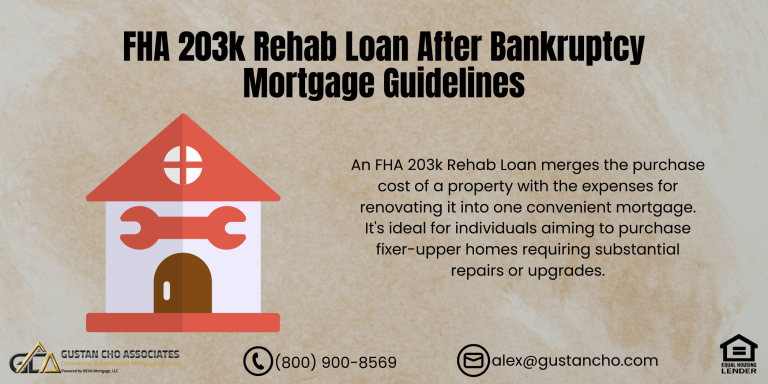In this blog, we will discuss and cover second home versus investment home financing. For homeowners who currently own a primary residence, they can possibly qualify for a second home on their next home purchase. A second home can be a vacation home in a resort area or just a regular condominium or single-family home. In the following paragraphs, we will cover second home versus investment home financing.
Down Payment on Second Home Versus Investment Home Financing
Second home financing requires more of a down payment than an owner-occupied home. Conventional mortgage lending guidelines require a minimum of 10% down payment for second-home financing. Dale Elenteny, a senior mortgage loan originator at Gustan Cho Associates says the following about second home versus investment home financing:
Second-home financing mortgage rates are slightly higher than owner-occupied homes. Maybe 1/8% or 0.25% higher than primary residence mortgage loans. Second-home financing has strict requirements.
If the second home buyer does not meet the second home financing mortgage guidelines, the second home financing will not be allowed. It will need to be financed as an investment home mortgage loan. In this article, we will cover second versus investment home mortgage guidelines.
Second Home or Investment Property?
Know the difference before you apply—rates, down payments, and rules vary.
Classification of Second Home versus Investment Home Financing
For homebuyers buying a second property, the home purchase needs to qualify as a second home financing property. If it does not, the lender will classify it as an investment home financing. John Strange, a senior mortgage loan originator at Gustan Cho Associates says the following about second home versus investment home financing:
With investment home financing, the minimum down payment is 20% to 25%. Mortgage rates are 0.50% or higher on investment properties because lenders consider it a higher risk.
There are certain criteria for property to fall into the second home financing category. For second home financing, second home buyers need a 10% down payment versus a 20% to 25% down payment, and mortgage rates are over 0.50% lower than investment home financing.
Second Home Versus Investment Home Financing Qualification Requirements
There are certain requirements for a second property purchase to qualify for second home financing. The deal needs to make sense. Dale Elenteny, a senior mortgage loan originator at Gustan Cho Associates says the following about second home versus investment home financing:
Homeowners who live in Tampa, Florida in a 2,500 square feet home and want to purchase another 2,500 square feet home two miles away from a primary residence, the second property purchase will not qualify for second home financing.
On this case scenario, the second property purchase will qualify for an investment home financing and not second home financing. However, if buyers were to purchase a 2,500 square feet home in Vail, Colorado, this purchase will qualify for second home financing because there is a great distance from Tampa, Florida to Vail, Colorado.
Second Home Financing Similar To Primary Home Loans
Homebuyers can qualify for second home financing on a home purchase that is close to their primary residence. The only way homebuyers can qualify for second home financing on a property that is nearby main owner-occupied residence is if the second property purchase is the following:
- Waterfront property
- Oceanfront property
- Golf course property
The second home needs to make sense where the homeowner can use it as a second home due to the amenities and luxury of the second home purchase.
Second Home versus Investment Home Financing
Learn how second home and investment home financing differ in 2025. Get the latest requirements, rates, and mortgage options for the year ahead.
Understanding the Difference Between a Second Home and an Investment Home Financing
Suppose you’re ready to buy a property beyond your primary dwelling. In that case, defining it as a second home or an investment property is key. This label matters because lenders tailor mortgage terms, down payment levels, and interest rates to how you plan to use the place.
A second home is usually a vacation house or a seasonal spot where you’ll stay for part of the year. An investment home is bought to rent out or to sell later for profit. They may seem the same initially, but the lending rules diverge sharply.
Mortgage Rules for Second Home Versus Investment Home Financing
Because lenders treat a second home like a personal residence—even if you spend only a few months there—the terms are often more borrower-friendly than those for investment properties. Configuring the mortgage typically demands a down payment of at least 10% to 20% of the purchase price, and some programs might even go as low as 5% for buyers with strong credit.
As for rates, interest tends to hover near the primary home level because lenders judge the repayment risk as lower. You can lock in a fixed or adjustable-rate mortgage and opt for a 30- or 15-year term, making monthly budgeting easier.
Financing an Investment Home
The moment you buy a place with the intent to rent or flip it, it earns the investment label, and the mortgage terms shift. Down payment requirements jump, often landing between 15% and 30% of the home’s price, with investors tipped to pay 20% or more to avoid costly private mortgage insurance (PMI).
Interest rates for investment properties usually run about 0.5% to 0.75% higher than those for primary and second homes, reflecting the perceived risk. You can still find fixed and adjustable-rate options. However, most investors lean toward a 30-year fixed mortgage to maintain payment consistency in a volatile market.
Not Sure Which Loan You Need?
We’ll guide you through lender requirements, occupancy rules, and approvals.
Which Option is Right for You in 2025?
Choosing between a second home and an investment property depends on how you plan to use it. The second home route works if you crave a personal getaway and can swing the higher down payment. If your goal is cash flow and you’re comfortable with risk and higher upfront costs, lock in an investment loan.
Before moving, check your credit score, compare lenders, and run the numbers on both scenarios. The right paperwork at the start can save you thousands later on.
Second Home Loan Requirements
- Down Payment: Expect to pay 10% or more of the home’s price.
- Credit Score: Most lenders want at least a 620 FICO score, but a score above 700 can get you better interest rates.
- DTI (Debt-to-Income Ratio): Keep your DTI below 45%.
- Usage: The property should be for your personal use.
- It also needs to be far enough from your main home—usually at least 50 miles away—to count as a second home.
Interest Rates on Second Home versus Investment Home Financing
Interest rates for second homes are often similar to those for primary residences. They may be slightly higher because lenders view second homes as a greater risk.
Mortgage Rules for Investment Home Financing
An investment home mortgage is for buyers who plan to rent the property or use it solely to make money. Since this approach comes with more risk, lenders impose tougher standards.
Investment Home Loan Requirements
- Down Payment: You’ll likely need to put 20% to 25% down.
- Credit Score: Aim for a score of at least 680 to qualify.
- DTI (Debt-to-Income Ratio): Strict DTI limits usually keep you below 43%.
- Income Verification: You may count expected rental income to help meet income requirements.
Interest Rates on Rental Homes
Loans for investment homes have higher rates than those for vacation properties. Lenders see rentals as riskier. If tenants don’t pay, you’re left covering the mortgage without rental income to help.
Avoid Costly Mistakes
Choosing the wrong loan type can cost thousands—get it right the first time.
Key Differences Between Vacation Homes and Rental Properties
Occupancy Rules
- Vacation Home: You must use the home for some of the year.
- Rental Property: The main goal is to earn rent.
Down Payment and Reserves
- Vacation Home: You can put down as little as 10%.
- Rental Property: Plan for 20% to 25% down, plus extra cash reserves.
Loan Rates
- Vacation Home: Rates are similar to those for your main home.
- Rental Property: Rates are slightly higher to match the added risk.
Tax Benefits
- Vacation Home: You may deduct mortgage interest, but rent rules don’t count.
- Rental Property: You can deduct mortgage interest and most property costs.
- You must report the rent as income.
Tips for Picking Between a Vacation Home and Rental Property
- Pinpoint your purpose —Will you use it for family trips or to build rental income?
- Speak with your lender about your plans: Some buyers save more through investment property tax breaks, while others may save with a second home mortgage.
- Account for cash reserves: Lenders may ask for several extra months’ worth of mortgage payments tucked away when financing investment properties.
- Choose a lender with no extra rules: Work with firms like Gustan Cho Associates that stick to standard agency rules, making it simpler to get approved.
Common Questions about Second Homes versus Investment Home Financing
What’s The Biggest Difference Between a Second Home and an Investment Property?
It depends on who you let stay in it. A second home is for personal use, while an investment property is meant to be rented and earn money.
Can I Rent Out a Second Home?
A few short-term rentals usually won’t hurt, but renting it out long-term won’t count as a second home anymore.
Do I Need a Bigger Down Payment For a Second Home?
Yes, second homes usually require 10% or more down. However, many buyers can put down only 3–5% on a primary residence.
Are Mortgage Rates Higher on Rental Properties?
Yes. Lenders typically charge higher rates on rental properties than on second homes. The reason is simple: they view rental properties as riskier investments.
Can I Count Rental Income When Applying For a Loan?
Yes. Most lenders allow you to use future rental income to help boost your debt-to-income ratio, making qualifying for a loan easier.
Will I Need to Show Savings For a Second Home?
Sometimes. While reserves for second homes can vary, lenders often require stricter cash reserves for investment properties. You might need to show 6–12 months’ worth of mortgage payments in savings.
Can I Turn My Second Home Into a Rental Later?
Yes, but be aware you’ll need to refinance your loan once you switch from occasional use to full-time rental.
What Credit Score Do I Need For an Investment Loan?
Most lenders look for a credit score of at least 680. However, some programs may accept a lower score if you make a larger down payment.
Are Second Home Loans Harder to Get?
Not really. They usually follow the same basic rules as loans for primary residences. However, they often come with slightly higher down payment requirements.
Which is Better: A Second Home or an Investment Home?
The choice really hinges on what you want to achieve. A second home is perfect for a personal vacation spot; it usually has nicer loan terms and is meant for family use. On the other hand, an investment home is the right pick if you want to earn rental income or build equity. Loans for investment properties can be tougher, but they match the income goal.
Qualifying For Second Home Versus Investment Home Financing
Home Buyers who need to qualify for primary, second, or investment home financing with a mortgage company licensed in multiple states with over 160 wholesale mortgage lenders, please contact us at Gustan Cho Associates. We have dozens of wholesale mortgage lenders with no lender overlays.
Gustan Cho Associates is licensed in 48 states, including Washington DC, Puerto Rico, and the U.S. Virgin Island and can answer all of your questions on second home versus investment home financing.
We are experts in helping second home versus investment home financing at competitive mortgage rates. Please contact us at Gustan Cho Associates at 800-900-8569 or text us for a faster response. Or email us at gcho@gustancho.com. Gustan Cho Associates is a mortgage company licensed in 48 states with a national reputation of its no mortgage lender overlays on government and/or conventional loans business model. We are available 7 days a week, on evenings, weekends, and holidays.
Turn Dreams or Investments Into Reality
Whether it’s a vacation getaway or rental income, we’ve got the right loan.








